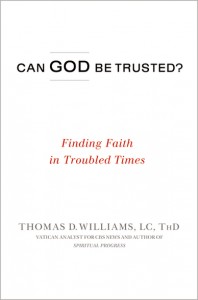 The publisher of Thomas D. Williams’ Can God Be Trusted? Finding Faith in Troubled Times sent me an early review copy of the book. I finally read through it today and now offer the following thoughts for anyone who might be interested. This review may be slightly peculiar in that I’m going to offer my thoughts on the actual book’s appearance and then simply list pros and cons of the content and appearance. It’ll be fun. Read on.
The publisher of Thomas D. Williams’ Can God Be Trusted? Finding Faith in Troubled Times sent me an early review copy of the book. I finally read through it today and now offer the following thoughts for anyone who might be interested. This review may be slightly peculiar in that I’m going to offer my thoughts on the actual book’s appearance and then simply list pros and cons of the content and appearance. It’ll be fun. Read on.
First Impression
The cover design is very unassuming. The background’s empty. Just white. Title at the top like you’d expect. A splash of red gives the subtitle and then the author’s name at the bottom. There’s nothing about the cover of this book that’s going to grab your attention. It’s all about the (scandalous?) title for this one. Why God in the title is over- and underlined is beyond me, which isn’t to minimize the importance of God by any means. I do find it quite tacky when author’s feel the need to append the title of their degree(s) to their name on the front cover. Nobody cares that you have a ThD. In fact, most readers probably think it’s a knock off a PhD anyways. There’s no reason for an author to include their degree(s) near their name on a book. Make a reputation for yourself by writing something worth reading and then we may check to see where you went to school and what degree you got, if we feel like it.
The book has no index. If you’re going to take the time to write a book worth anyone’s consultation, take the time to prepare or have prepared an index. Please. The back cover gives no endorsements which to me is only of minimal importance. I do appreciate a short bio of the author on the back of a book. That, however, is lacking here.
Cons
- No index
- Cheesy inset quotes with borders (you know the kind)
- ThD on cover
- Uses myriad Bible translations throughout the book (eight in all). Makes me wonder if he simply selected translations that fit the interpretation he wanted the text to have. Makes me uneasy.
- Borderline semi-pelagian at points (pp. 147-150).
- Synergistic view of God and man in salvation. E.g., “It is no exaggeration to say that he [God] depends on our cooperation for our own salvation…” (p. 166).
Pros
- Decent printing/typesetting/typography–what’s the best word?
- Catching chapter titles. Flicking through the table of contents is interesting enough to continue reading.
- Asks hard questions. For example, Chapter 9 “What To Do When God Lets You Down.”
- Addresses practical concerns (pp. 88-92). Can I trust God if he doesn’t bring me a spouse or if my wife and I are unable to have children?
- Quotes from a wide body of notable Christians including William Carey, Thomas Merton, Mother Theresa, St Augustine, C.S. Lewis and a pope or three among others.
- Illustrates points well. The story of the teacup on pp. 99-100 is exemplary.
- Not trite in the least. He lists God’s “nonpromises” to perhaps startle some readers out of a pet-god theology.
Who Should Read This?
Have you really struggled with trusting God and need practical pastoral guidance? If yes, read.
What Should I Read Instead?
John Piper’s Spectacular Sins, if you don’t mind a book that doesn’t pussyfoot (not that Williams does).
Can God Be Trusted?
Yes.
Overall Rating
6/10
CommentsOnToast